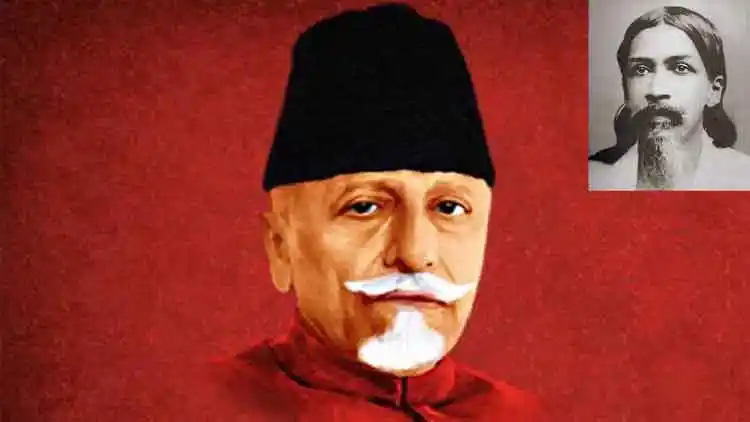
 Saquib Salim
Saquib Salim
Throughout human history, rulers have controlled political power by dividing people. The more efficiently they could divide, the better was their control over politics. The British, who ruled over India, were masters at dividing people. During their rule for two centuries, they divided India into religions, castes, languages, and races. I am not trying to argue that these groups did not exist before but they were not as cohesive.
The Maulana in the name of Abul Kalam Azad creates the image of a bearded Muslim man and that of Aurobindo Ghosh of an orthodox Hindu in our minds. This is due to the way we have been taught the history of the Indian national movement. Our westernized minds take people as either Hindus or Muslims; they cannot be Indians.
Now if I tell you that Aurobindo Ghosh was the man who initiated Maulana Abul Kalam Azad into the first education minister of free India, not everyone would believe.
Maulana Azad belonged to an orthodox Muslim family. His father, Maulana Khairuddin, was an eminent Islamic scholar and respected across the globe. Azad took lessons in Persian, Arabic, Islamic theology, and philosophy from his father. By the age of 16, Azad was a scholar. However, he had since developed doubts regarding sectarianism within Islam and religion-based hatred among humans. This is when he started thinking about these issues. He decided to break away from his father’s religious and social views. Quite meaningfully, he took ‘Azad’ (free) as a pen name.
In the year 1905, Bengal was boiling with anti-British sentiments because of the partition of the province. Abul Kalam lived there. A section of armed revolutionaries was fighting against the foreign rulers under the banner of secret organizations like Jugantar and Anushilan Samiti. These revolutionaries, led by leaders like Aurobindo, were Hindus and nursed ‘anti-Muslim’ sentiments. In the words of Azad, “In fact, all the revolutionary groups were then actively anti-Muslim. They saw that the British Government was using the Muslims against India's political struggle and the Muslims were playing the Government's game. East Bengal had become a separate province and Bamfield Fuller, who was then Lieutenant-Governor, openly said that the Government looked upon the Muslim community as its favorite wife. The revolutionaries felt that the Muslims were an obstacle to the attainment of Indian freedom and must, like other obstacles, be removed.”
Azad also believed that the British imported Muslim officers from U.P to act against the revolutionaries to deepen the impression against Muslims. Around that time, he met Shyam Sunder Chakravarty, a well-known revolutionary and close aide of Aurobindo. Azad developed a friendship with Chakravarty, who took him to Aurobindo. These meetings resulted in something which would turn the course of the Indian Freedom Struggle and gave to the nation one of its most illustrious servants. Inspired by Aurobindo, Azad, an Islamic scholar, joined an armed revolutionary group. Azad wrote, “I remember I met Shri Aurobindo Ghosh on two or three occasions. The result was that I was attracted to revolutionary politics and joined one of the groups.”
Azad wrote that initially, these revolutionaries were suspicious of a Muslim joining their ranks but soon they understood that apart from a few, Indian Muslims were also as anti-British as Hindus were. Soon several other Muslims, under the influence of Azad, joined these armed revolutionary groups. These organizations were limited to Bengal province until then. With the efforts of Azad, these organizations started recruiting in U.P, Maharashtra, Gujarat, and other provinces also.
Meanwhile, Azad toured different countries and formed an international public opinion in favour of the Indian National Movement. In 1912, he started Al-Hilal, an Urdu weekly to popularize the nationalist message among the Urdu readership. The first of its kind, the paper was later banned and his printing press confiscated. CID reported that Al-Hilal and Madrasa established by Azad in Kolkata were dangerous for the British empire. Azad also formed a revolutionary group of Muslims, mostly Bengali, Hizbullah. The group had, according to CID, at least 1700 members, who took an oath to die for the cause of freedom.
Azad was imprisoned during the First World War for conspiring to ‘wage war against the empire’. After his release in 1920, he adopted a non-violent approach. He believed that the nation was not ready for an armed struggle, so non-violent struggle seemed the best bet. Azad wrote, “for me, non-violence was a matter of policy, not of creed. My view was that Indians had the right to take up the sword but in the given circumstances, Gandhi's method was right. Our decision to fight non-violently was therefore compelled by circumstances. It was not a matter of creed for me and many other Indians. If freedom could be obtained by fighting, we would certainly participate in the war.”
In the times when history is being seen through the lenses of narrow political interests, we need to reclaim the Indian, Indianness, and the unity, which runs through it. It is India, where a Maulana was initiated into the national movement by a religious Hindu. Let us bring this politics of Indianness back into the mainstream and defeat sectarian interests.
(Saquib Salim is a historian and a writer)
